Pharmacists can help improve health outcomes for men, especially if they use communication skills to draw out those who don’t often visit doctors, as Thea Cowie reports.
The health and life expectancy of Australian men has increased dramatically in recent decades. A boy born today can expect to live to 80.5 years – more than 12 years longer than his grandfather born in 1960.1
But a gender gap remains: girls born today are likely to live more than four years longer than boys.1
In certain populations male life expectancies are significantly lower, with boys born in remote areas today expected to live to 76 years,2 and Aboriginal and Torres Strait Islander boys facing a lifespan of just 71.6 years.3
Quality of life is also a concern for men, with males experiencing a greater share of the total disease burden (53%) than females (47%), and one in two men (46%) having at least one common chronic condition.4
It’s perhaps not surprising then that early evidence showed COVID-19 is hitting men harder than women. In China and New York, coronavirus in April killed men at almost twice the rate of women, while hospitalisation and infection rates were also higher in men.5,6
So why the gap?
It has been theorised that one reason for the disparity in health outcomes is that men are less likely to seek medical attention than women. And data shows Australian men claim 25% fewer Medicare services per year than they do.4
But CEO of Healthy Male (previously Andrology Australia), Simon von Saldern, said that statistic masked some important nuances, and that more than 80% of men had in fact visited a GP in the past year.7
‘It’s a bit of an urban myth that men are not accessing healthcare. They do access it, they just access it differently from women,’ he said.
‘For example, a guy tends to go to a GP with one health concern – you can tell that from the Medicare service statistics that show that generally the doctor claims one item per visit for men. But when a woman turns up, she tends to go almost with a shopping list of items; she’s going to the doctor so she’s going to make it count.’
But while women tend to have a higher use for some health services such as GPs due to gynaecological and obstetric conditions throughout their lives, Australian men tend to visit health professionals less frequently and at a later stage of a condition, statistics reveal.8
The Director of Western Sydney University’s Men’s Health Information and Resource Centre Dr Neil Hall said that men also faced unique barriers to help-seeking.
‘One is the availability of support services – many are open only during business hours and many have not made an effort to be male-friendly,’ he said.
Cultural barriers and reduced opportunities for men to attend health services have also been long recognised as due to factors such as lack of transport, previous bad experiences or paucity of services in particular areas.
Dr Hall said some of the reluctance to seek help was generational and influenced by gender or sexual identity.
‘Emerging research that I’m involved in is beginning to show that in teenage males the pattern is changing: 60% of boys surveyed were not uncomfortable talking about their feelings or seeking help for health-related problems,’ he said.
National initiatives
In April last year the federal government launched the National Men’s Health Strategy 2020–2030.7 It set out five priority issues: mental health; chronic conditions; sexual and reproductive health and conditions where men are over-represented; injuries and risk taking and healthy ageing.
The strategy identified allied health workers – including pharmacists – as important agents for proactively engaging men and boys in prevention and early detection activities.
It also prioritised training for allied health professionals to deliver ‘holistic, evidence-based best practice approaches to men’s health and wellbeing across the life course’.
Mr von Saldern said pharmacists were in an excellent position to get a better understanding of men’s health and wellbeing.
‘Understanding and identifying the link between conditions is a really important role for pharmacists – I just can’t emphasise that enough. A lot of men’s health conditions are so interconnected,’ he said.
‘For example, the link between heart conditions and erectile dysfunction, diabetes and erectile dysfunction, diabetes and balanitis (inflammation of the glans penis).
Conversation starters
The way pharmacists have conversations with men can also be important, according to Dr Hall.
‘Standing face-to-face and asking, ‘how are you feeling?’ is generally not going to produce a positive response,’ he said.
‘But standing side by side and asking, “how are you going?” or “what have you been doing?” might open the gate a little bit more easily.
‘And one of the best things a pharmacist can do if they’re aware of men going through grief, loss, unemployment or loss of a business is to be able to refer them to other support services.’
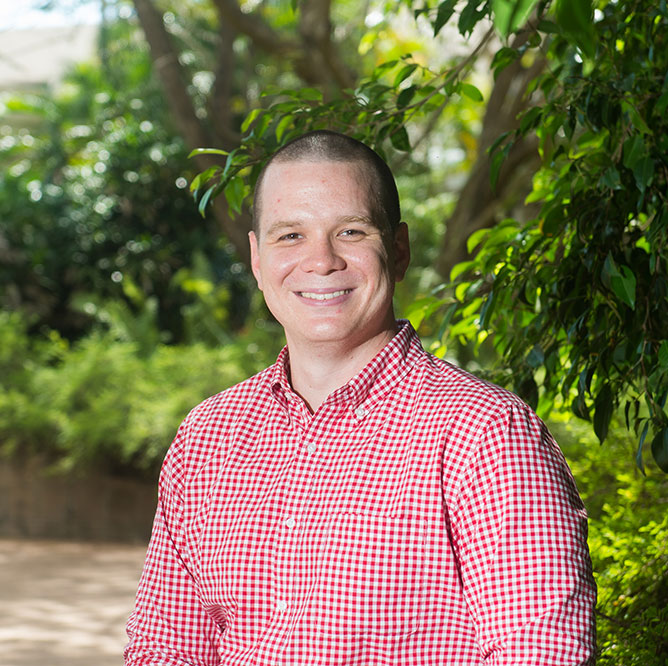
Northern Territory pharmacist Sam Keitaanpaa MPS, who works in Berry Springs servicing patients in Darwin’s rural area, knows that engaging male patients is often daunting.
Starting with the ‘safe’ topics – sport, the weather and local events – can help, he says. ‘I work with men from 16 to 96, some who are the quintessential ‘modern man’ and others who self-describe as ‘rougher than a sandpaper massage’.
In many cases, Mr Keitaanpaa says, men wanted problems solved. So, pharmacists should position themselves as ‘the trustworthy problem solver’, which can mean ‘shooting straight’ with an honest, informed opinion when advising against an unnecessary medicine.
‘The number of patients I have converted from Chlorsig to Systane is incredible, simply because I explained why one was better for their presenting symptoms. They are appreciative you had their best interests at heart.’
‘I’ve had amazing opportunities to get people onto life-saving antidepressants, see a doctor for the first time in 10 years or even just start taking their statins again,’ said Mr Keitaanpaa.
‘All of this has always been from leveraging that trust and accepting that often issues we consider taboo or embarrassing are actually made worse if they are broached softly or in coded language.’
Sam Keitaanpaa’s tips
|
Pharmacist-led initiatives
Samford TerryWhite Chemmart: community engagement
Karen Brown MPS has organised an annual men’s health night in Samford, Queensland, over the last 4 years.
‘It’s all about getting men along to the local footy club where they have a drink at the bar with their mates and listen to a guest speaker give some very subtle health messages,’ she said.
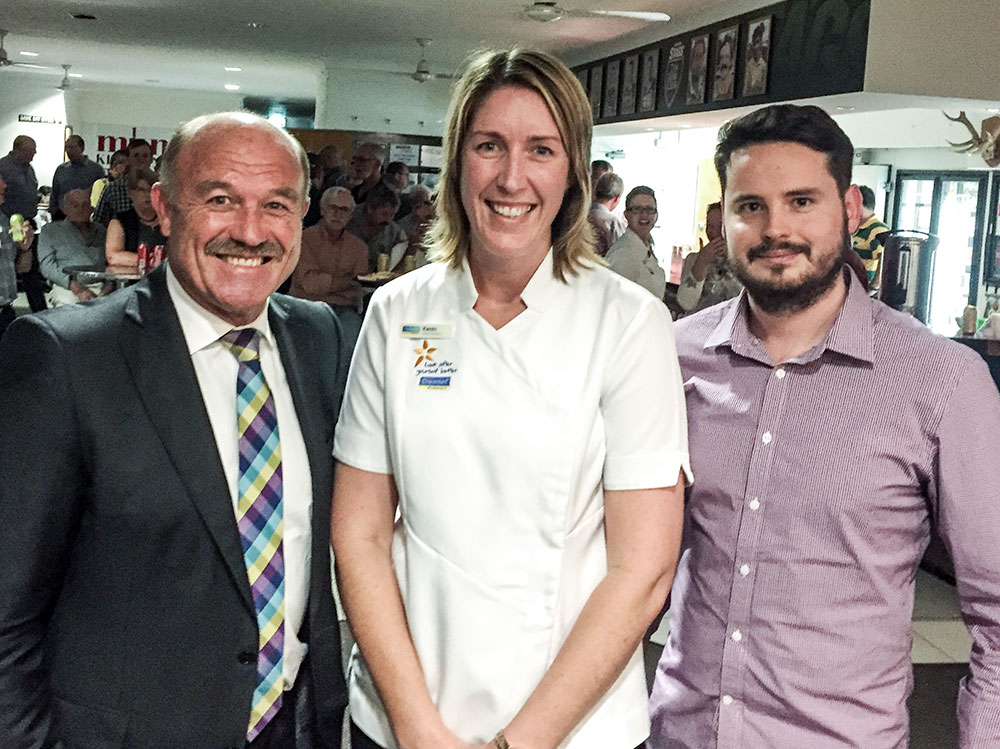
Ms Brown said footballers Wally Lewis and Alastair Lynch had been among the guest speakers who had been incredibly effective at engaging men.
‘If I said to the men: “Come along to the health night – myself, the psychologist and the GP will talk to you”, probably no one would turn up,’ she said.
‘But when I say, “a footballer is speaking” or “Glenn Azar is talking”, they want to come and listen to their stories.’
Ms Brown said she still vividly remembered Wally Lewis speaking about his experience with epilepsy in 2016.
‘The next day a lady came into the pharmacy saying, “thank you for last night – my husband just booked to see his doctor because he has extreme mental ill health and he thought, “if Wally has the guts to speak up, why can’t I?”’
The casual events – with drinks, nibbles and mingling – had also helped to make pharmacists appear more approachable, said Ms Brown.
‘From a business perspective, we see a lot of people at the events who aren’t our patients, but then afterwards you have a connection and they become your patients,’ she said.
Cooleman Court Pharmacy: the launch of Men’s Health Downunder
For pharmacist and managing partner Brad Butt MPS at Cooleman Court Pharmacy, ACT, the move towards dedicated men’s health services began when a man called Michael presented at the pharmacy in 2012.
‘Michael was one of my regulars and he came in wanting assistance getting a vacuum erection device,’ Mr Butt recalled.
‘I wasn’t quite sure how to field that question so I contacted his urologist. And the urologist said: “Look, we need some help – if you can help these blokes do their penile rehabilitation after they’ve had their prostatectomy we’d love to support you.”’
Men’s Health Downunder was soon established and has since helped thousands of men across Australia with their health ‘down under’.
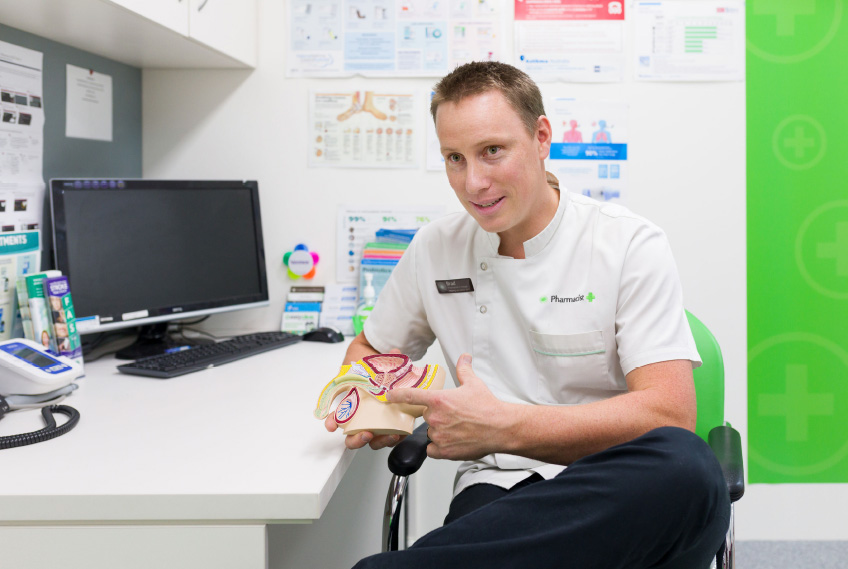
‘We help with anything that pertains to the male anatomy – incontinence, erectile dysfunction, penile rehabilitation, Peyronie’s disease, helping manage prostate cancer, low testosterone, buried penis, fungal infections of the groin,’ Mr Butt said.
While nurses would often traditionally help with the management of these conditions, Mr Butt is passionate that pharmacists should be involved.
‘A lot of managing these conditions involves medicines and compliance,’ he said. ‘There’s nobody better than pharmacists at optimising compliance and quality use of medicines, dealing with and reporting side effects.’
Men’s Health Downunder now operates from multiple community pharmacy sites including Cooleman Court Pharmacy and also has a dedicated clinic employing three pharmacists, including Tim Stewart MPS.
A website launched several years ago allowed the business to take referrals from interstate and other telehealth and e-commerce services, while at the same time offering education for pharmacists, Mr Stewart said.
‘If pharmacists are interested in working in this space they can subscribe to the service or email us. We can help educate them to deliver services and connect them with referrers in their local area,’ he said.
AFS Pharmacies Rockhampton: partnership with Men’s Shed
AFS Pharmacies in Rockhampton has sponsored the local Men’s Shed since it was established in 2013. ‘We’re owned by the local community so we wondered what else we could do to assist. Men’s health was identified as an issue,’ said retired CEO of the Australian Friendly Society, Mark Woltmann, who went on to become the Men’s Shed chairman.
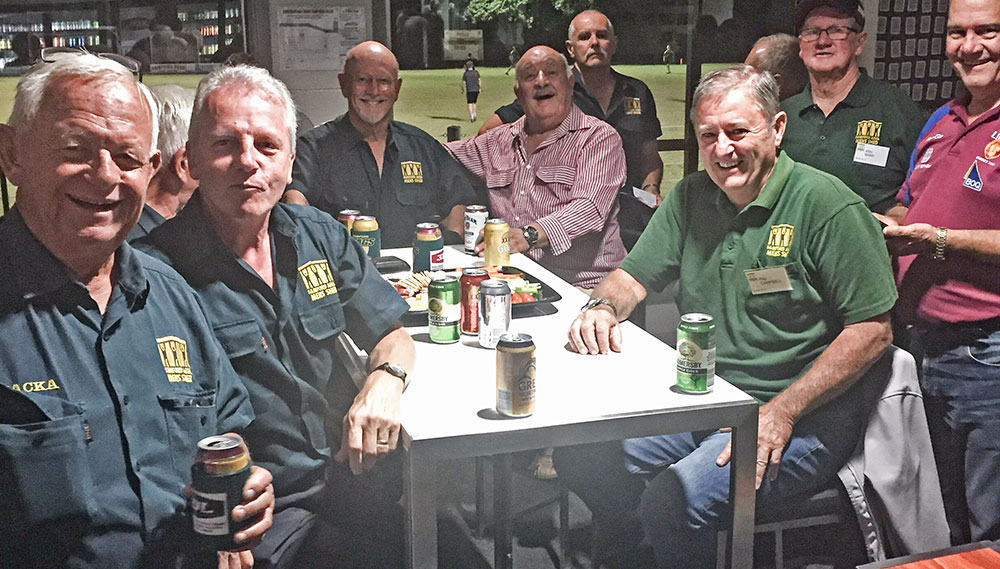
Mr Woltmann said the pharmacy group had given talks on men’s health occasionally, but that sponsoring the shed was more about providing a place where men were comfortable to raise concerns informally.
‘The motto of Men’s Sheds is “shoulder to shoulder” so we see guys working on a project in the shed together and while they’re working it starts to come out – the men become a support mechanism for each other while they’re going through health issues,’ he said.
‘I’ve had a number of members say: “If it wasn’t for the men’s shed and having somewhere to go, I would have had a go at killing myself”.’
Mr Woltmann said that an internal survey, taken 5 years after the partnership began, suggested that 60% of people who presented at the tills were male.
Pharmacists providing ED counselling and medicines over-the-counter: New ZealandNew Zealand’s non-prescription model of supplying sildenafil (Viagra) can ‘enhance the primary care role played by community pharmacists’, a recent study has found.9 ‘[Supplying sildenafil has] probably exceeded [my expectations],’ a rural pharmacy owner interviewed by the researchers said. ‘I was a bit sceptical – I wasn’t quite sure what we were going to be in for and whether we were going to get lots of the recreational type users. But, actually what we’ve found is that, by and large, we’re making a real difference…one person that came back to get his repeat thanked us profusely.’ Since 2014, when sildenafil (up to 100 mg) was reclassified in New Zealand to allow supply by pharmacists who have completed approved training for the treatment of erectile dysfunction in males aged 35–70 years, it has been supplied without prescription. ‘Training was seen as uncomplicated and the screening tools provided confidence that key consultation areas were covered,’ the research paper concluded. ‘Most consultations reportedly took 15–20 minutes, some up to 60 minutes.’ And while pharmacists reported being comfortable with the consultations, areas for improvement were identified. ‘Many pharmacists estimated that over half (range 10–80%) of new requests for sildenafil resulted in medical referral without supply, commonly because of smoking, age over 70 years, or elevated blood pressure, occasionally diabetes and multiple medications were mentioned,’ the paper stated. New Zealand isn’t the only country to allow pharmacists to supply non-prescription sildenafil – Poland followed suit in 2016; the United Kingdom in 2017. *Australia’s Therapeutic Goods Administration was to reconsider an application for sildenafil to be down-scheduled to Schedule 3 last month.10 |
Additional engagement strategies
The Samford, Cooleman Court and AFS pharmacy initiatives are united by a common theme: the importance of building relationships with men – in the pharmacy or the community.
But pharmacies don’t need to establish formal programs to engage effectively with men. Mr Stewart said it could be as simple as having a space that makes men feel more welcome or, at least, less excluded.
Cooleman Court Pharmacy, for example, took the step of removing products perceived as feminine – or not directly health related – such as cosmetics, gift bags and Homyped shoes. ‘But it doesn’t need to be that overt,’ Mr Stewart said.
‘It could be that in your private consult room, you have a drawer dedicated to men’s health with a penis dummy that you can use to demonstrate how to do an intracavernosal injection, for example.’
Mr von Saldern also suggested that prominently displaying male-specific health information – such as Men’s Health Week posters or videos – and providing printed men’s health resources could make pharmacies more inviting for men.
Men’s health and support servicesAustralian Men’s Shed Association: Healthy Male: MensLine Australia: Men’s Advisory Network: Men’s Health Downunder: Men’s Health Information and Resource Centre: Mental Health First Aid: |
References
-
- Australian Institute of Health and Welfare. Deaths in Australia. 2019. At: aihw.gov.au/reports/life-expectancy-death/deaths-in-australia/contents/life-expectancy
- Australian Institute of Health and Welfare. Rural & remote health. 2019. At: aihw.gov.au/reports/rural-remote-australians/rural-remote-health/contents/health-status-and-outcomes
- Australian Bureau of Statistics. Media release: Aboriginal and Torres Strait Islander life expectancy lowest in remote and very remote areas. 2018. At: https://bit.ly/2RKnzyI
- Australian Institute of Health and Welfare. The health of Australia’s males. 2019. At: aihw.gov.au/reports/men-women/male-health/contents/who-are-australias-males
- The Novel Coronavirus Pneumonia Emergency Response Epidemiology Team. Vital surveillances: the epidemiological characteristics of an outbreak of 2019 novel coronavirus diseases (COVID-19) – China, 2020. China CDC Weekly 2020;2(8):113–122. At” http://weekly.chinacdc.cn/en/article/id/e53946e2-c6c4-41e9-9a9b-fea8db1a8f51
- New York City Health Department. COVID019 Tracker. Fatalities [as of April 2020, updated daily]. 2020 At: https://on.ny.gov/2VBN4Dn
- Australian Government Department of Health. National Men’s Health Strategy 2020–2030. At: https://bit.ly/2xE4W8G
- State Government Victoria. Department of Health & Human Services. Engaging men in healthcare: information resource paper. Melbourne: State of Victoria; 2015. At: https://www2.health.vic.gov.au/Api/downloadmedia/%7BE495C81C-4357-463A-BD49-2A9A0863DE51%7D
- Braund R, Ratnayake K, Tong K, et al. Pharmacist supply of sildenafil: pharmacists’ experiences and perceptions on training and tools for supply. Int J Clin Pharm 2018;40(3):650–658. At: https://pubmed.ncbi.nlm.nih.gov/29605946/
- Therapeutic Goods Administration. Consultation: Proposed amendments to the Poisons Standard – ACMS and Joint ACMS/ACCS meetings, June 2020. At: tga.gov.au/sites/default/files/consultation-proposed-amendments-poisons-standard-acms-and-joint-acms-accs-meetings-june-2020.pdf



 Pharmacists have always prescribed, but they have the potential to prescribe much more
Pharmacists have always prescribed, but they have the potential to prescribe much more



 Sponsorship information
Sponsorship information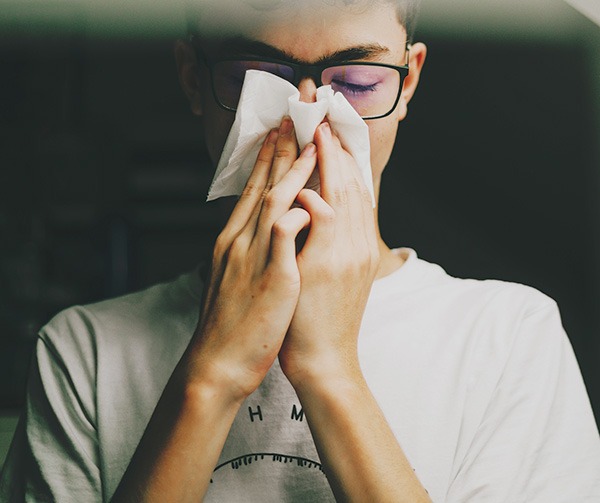
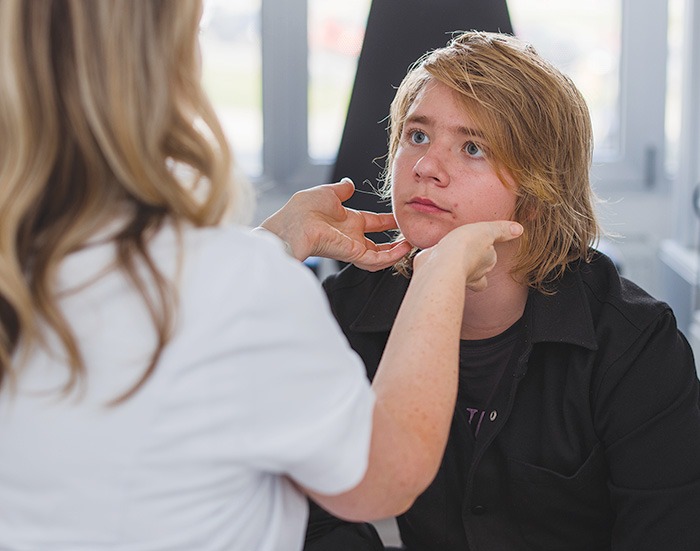
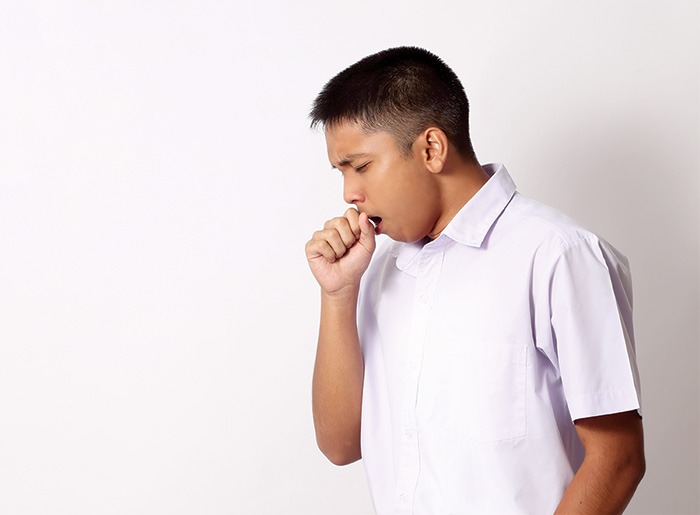
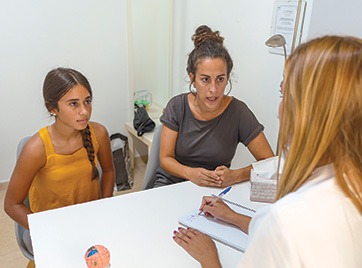 Talking to patients who have questions
Talking to patients who have questions





